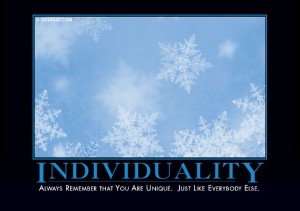
If you think about it, it is obviously not possible to completely and accurately describe a person’s personality in one sentence. Unfortunately, that’s about as much thought as most people will give you. The best way to understand how other people summarize you is to listen to how they introduce you to others, because they have one sentence to convey to the new person everything that is important to know about you.
“He’s the guy that jumps.”
In 2007, I was at the after party for a conference and sat down at a table with a couple of strangers. Before my butt reached the chair, the guy on my right who I had never met before said to the guy on my left who I had never met before, “This is Brian Shaler. He’s the guy that jumps.” I was surprised and amused. I rolled with it. If I took myself more seriously, I would insist that I’m not nearly some guy who jumps, but an astute software developer. It’s a strange feeling to be summarized by something silly you did instead of what you’re most proud of.
I learned a lot by being the guy that jumps. I learned about how people try to put you in a box and how they decide to represent you internally and externally. Not everyone can appreciate my skills. Like my parents, for example, who would probably describe me the same whether I did data visualization or made WordPress themes—”he does stuff with the computer,” or “he makes web sites.” Now, my parents actually care, and they try to understand. So what happens when people don’t care, or don’t try? As it turns out, they’ll try to put you in the easiest box that seems to fit, based on the most vague knowledge about you. It will tend to be the first thing they learned about you, the thing they most understand (often the simplest), or the thing they find the most intriguing or unique.
Boxes are hard to escape.
Once someone puts you in a box, it will be very difficult to get them to change how they summarize you. This is part of the reason first impressions are so critical. If you say something offensive within a few seconds within seconds of meeting someone, they’ll likely see you as a crass person from then on, even if what you said turns out to be uncharacteristic of you. If someone meets you as “the guy that jumps,” chances are they will introduce you to the next person in the same way.
If you don’t fit their understanding, they’ll fit you to their understanding.
If you’re an impressionist artist, someone who doesn’t understand Impressionism will describe you using the things in your art, rather than what is being being conveyed in the art. For me, my skills with programmatic animation, data visualization, and interactive interfaces are often summarized as “making web sites,” because some of it may exist on the web and people are more likely to understand what making web sites means. Ideally, you would be described as what you are, but if the person doing the describing doesn’t share your knowledge on the subject, they will make up something that sounds close enough to them.
If you do something sticky, it’ll stick more than anything else, no matter how relevant it is.
There are pros and cons to being known for something more interesting or intriguing than what actually defines you. On the plus side, people with know, remember, and perhaps even talk about you. Unfortunately, most of those people won’t have any idea who you really are or what you really do. This was the case with the jumping persona. It would be great to have strangers introduce me to strangers as a talented interactive developer, but the people who understand my work deeply enough to appreciate it are few and far between. It also sounds less glamorous and exciting than a zany set of photos.
It was clear jumping was much more memorable and it was certainly a conversation starter. It didn’t convey anything of meaning about me or command any sort of respect, but it opened the door and got people’s attention. It showed me the power of intrigue, which I will ramble about in more detail in another post.